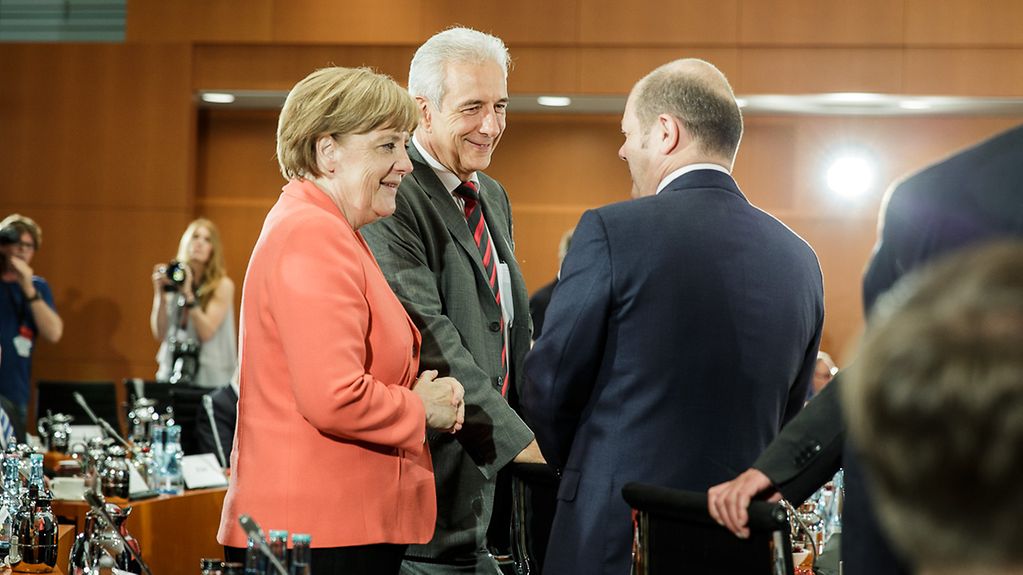Angela Merkel meets with state premiers
In view of the rising numbers of asylum seekers, the federal government is to double the assistance it provides to the individual federal states and local authorities.
4 min reading time

Chancellor Angela Merkel talks to Saxony's Premier Stanislaw Tillich and Hamburg' First Mayor Olaf Scholz
Photo: Bundesregierung/Denzel
Talks are also planned to explore ways in which the federal government can assume responsibility in future, reported Chancellor Angela Merkel after a meeting with the state premiers.
"We have agreed on a resolution proposal based on the principle that we see ourselves as a community of responsibility," said Chancellor Angela Merkel after a meeting with the state premiers at the Federal Chancellery. The federal and state governments, and local authorities all intend to do their bit to resolve "this exception problem" she said.
The Chancellor thanked everyone who has become involved in working with refugees to help people who are fleeing war and terrorism. "We are in agreement, however, that a distinction must be made between those who are entitled to protection and those who have no such entitlement, and who thus have no prospects of remaining in Germany," she said clearly.
The Federal Office for Migration and Refugees (BAMF) has forecast that more than 400,000 requests for asylum will be received by the end of the year – twice as many as in 2014. It is difficult to predict the numbers of asylum seekers from the Western Balkan states, said Thomas de Maizière at the beginning of May. In future a greater distinction is to be made between applicants: between those who have good prospects of being granted asylum or protected status in Germany, and those who are likely to have to leave Germany.
One billion euros worth of assistance from federal government
The federal government will take a number of steps, as will the individual states, announced Angela Merkel. In particular, the federal government will double the financial assistance it is providing this year. Rather than the 500 million euros pledged so far, it will make available one billion euros. This is to offset the increasing burden that rising numbers of asylum seekers and refugees are placing on state governments and local authorities.
"It is, however, important that this is not the end of the process, but that federal and state governments enter into a dialogue as to how we, also at federal government level, can take on responsibility in structural terms in future, depending on refugee numbers," stressed Angela Merkel. To this end a state-federal government working group will be established, headed by the Head of the Federal Chancellery and the Federal Minister of the Interior for the federal government. The federal states will be represented by the heads of their state chancelleries. "This is an important step," stressed the Chancellor.
Federal and state governments agree on an action plan
At their meeting the federal and state government agreed on an action plan. Asylum procedures are to be accelerated and the existing backlog of applications cleared. In many cases staffing levels are to be increased to this end.
The Chancellor and the state premiers also agreed on measures to integrate asylum seekers who have good prospects of seeing their requests accepted, and to help them improve their German language skills. "Those who have good prospects of remaining in Germany should be swiftly integrated," explained Angela Merkel.
Language courses are very important in this context. The federal government undertakes to "give asylum seekers and people with ‘tolerated stay’ status who have good prospects of staying in Germany access to 300 hours of integration courses as a top priority," she explained. Once their entitlement to protection is officially recognised this is to rise to 600 hours.
"I believe that we still have a lot of work ahead of us, but that the paper we have adopted today mirrors the spirit of shared responsibility," concluded the Chancellor. Nevertheless, there is still a lot to do "and the problem is huge".
European Council
Also on the agenda of the top-level meeting were the outcomes of the special meeting of the European Council on 23 April 2015 and the next meeting on 25 and 26 June in Brussels.
In her government statement in the morning, the Chancellor outlined the agenda of the European Council, "Migration policy, the fight against international terrorism, the situation in Ukraine and EU reforms and the key topics." Europe is facing huge challenges inside and outside the Union, she said in the German Bundestag.
At the conference of state premiers the federal states consult and coordinate their positions. They discuss and decide on issues relating purely to state level that are not dealt with by either the Bundestag or the second chamber of Germany’s parliament, the Bundesrat. The premiers of Germany’s 16 federal states represent the standpoints agreed at the conference of state premiers vis à vis the federal government. Twice a year this takes a special form, when the state premiers meet with the Chancellor following their conference.
The traditional duties of the conference of state premiers are concluding interstate treaties and agreements among states or with federal government. On example of this is the German Interstate Broadcasting Treaty. Educational issues are also often on the agenda. The state premiers generally meet four times a year at the conference of state premiers.